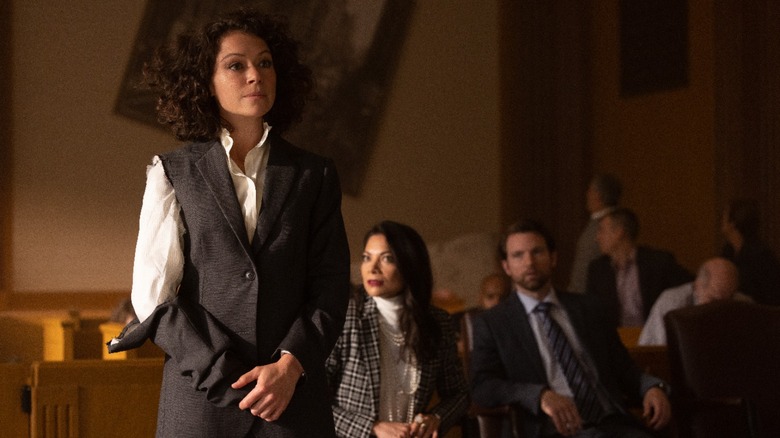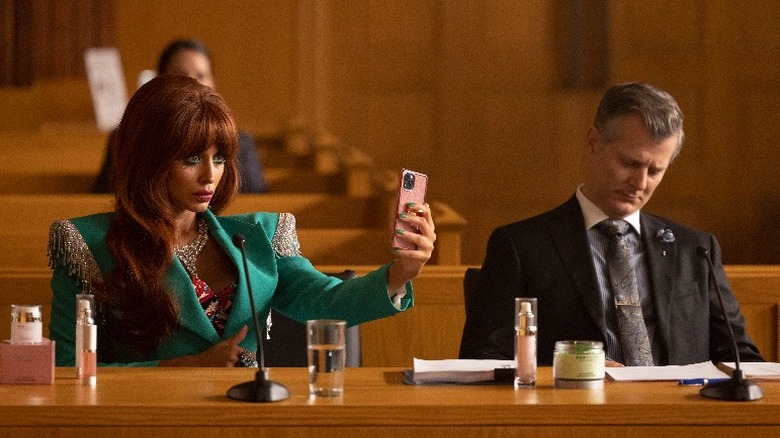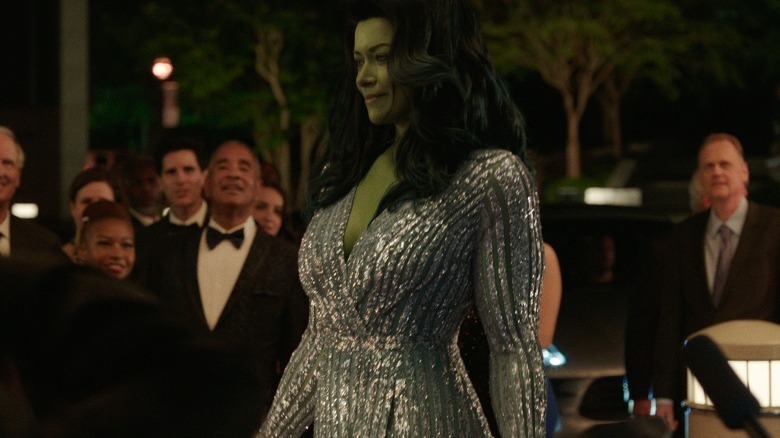She-Hulk Director And EP Kat Coiro On Heroes Who Take Up Space [Interview]
There's no hero quite like She-Hulk, and over a decade into the Marvel Cinematic Universe, there's also no show quite like the one "She-Hulk: Attorney At Law" promises to be. A mix of everyday superhero antics, courtroom comedy, and fourth-wall-breaking asides, the Tatiana Maslany-led comedy looks a lot different from the grandiose, universe-saving Avengers movies that have helped define Marvel Studios on screen.
The studio's recent forays into TV have created space for smaller-scale stories that explore unique characters and filmmaking voices, yet occasionally still manage to pack a big emotional punch. For "She-Hulk: Attorney At Law" director and executive producer Kat Coiro, bringing super-powered attorney Jennifer Walters to life meant honoring the source material (the character, like many Marvel heroes, was created by Stan Lee) and creating a visual style that pulled influences from groundbreaking women-driven legal comedies of years past.
Coiro, who joins "She-Hulk: Attorney At Law" after directing projects like Jennifer Lopez-led rom-com "Marry Me" and episodes of Netflix's dark comedy "Dead To Me," spoke with me via Zoom this week. The filmmaker spoke about the making of the new series, its hidden references to a quirky '90s show, and the importance of presenting a hero who takes up space -– literally and otherwise.
This interview has been lightly edited for brevity and clarity.
'Honor the comedy'
I've really appreciated how many distinct directorial styles we've seen in Marvel Phase Four. I was wondering if you could talk a little bit about how you found the look that you wanted for this series and what influenced your directorial style for it?
I wanted to honor the comedy. I have a comedy background and so much of comedy is very simply letting actors be and leaving room for improvisation and looseness. Now, of course, we have a show that is full of CGI and action and stunts, and also has to honor the MCU and feel like it's part of that universe. So it was really a balance of finding the moments for the big and then finding the moments for the small, and making sure that those transitions felt seamless. And that we were never went from a jarringly big cinematic extravaganza to little tiny comedy. But that was the biggest challenge of the series, for sure.
I drew on the comics and the character herself, who is self-referential and self-aware and large and in charge. I drew from "Ally McBeal" and "Legally Blonde," [which] I think took the legal genre and turned it on its head and injected it with pink and wildness. That's something we definitely do, is take something very familiar and make it a little bit strange. But really, it was the MCU films that I looked to, to make sure that we fit into the world.
Yeah. I can definitely see the "Ally McBeal" in there. Were you able to get any little "Ally" homages in?
There is, there is. If you look closely, there are some little hidden "Ally McBeal" details in the series. Look at the TVs.
'My dream is that they aren't called female superheroes anymore'
Okay. Awesome. At the press conference yesterday, you mentioned you were hoping people who didn't feel like there was a place for them in the Marvel fandom felt represented by the show. I was wondering if you had a specific audience in mind when you were making this show, just if you could speak a little bit more to that.
Well, look, I think I was speaking about being a little girl in a time where it really wasn't a part of being a little girl. Like, if you liked comics, you didn't really advertise it. I always liked them, but also never felt like I could like them publicly, if that makes sense.
Yeah.
And now I think that's changed, and the MCU has done such a great job of bringing female characters to the forefront. And I think this is just part of that evolution and that step. So I was talking about the new generation, just having it be normal to have female superheroes. My dream is that they aren't called "female superheroes" anymore. They're just superheroes, in the same way my dream is to not be ever called a "female director" again, but just be called a director. I want superheroes to join the pantheon, and some of them just happen to be women.
Yeah. That makes sense. Going off of that, given the themes of the powerful women in the show and the show expressing what they're capable of, to me, it seemed like a show that would be very empowering or cathartic to film. Was that a palpable feeling on set? Did it feel that way among the cast and crew?
Yeah. Absolutely. What's so funny is you're filming a character who doesn't necessarily exist in the frame. We have an actress in a mo-cap suit, but Tatiana brought so much gravitas and she did so much preparation to bring size to her small frame. So that was part of the magic, was watching this small person convey the power of She-Hulk. And I think we all took away from it this idea of standing in our power and not being afraid to take up space. I think as women, we're often conditioned to be small — physically, mentally, spatially. And She-Hulk, she doesn't give two hoots. She'll take up all the space in the world. Part of what's exciting about She-Hulk's journey is accepting that — accepting her size in the world, in a metaphorical way.
"She-Hulk" premieres on Disney+ on August 18, 2022.


